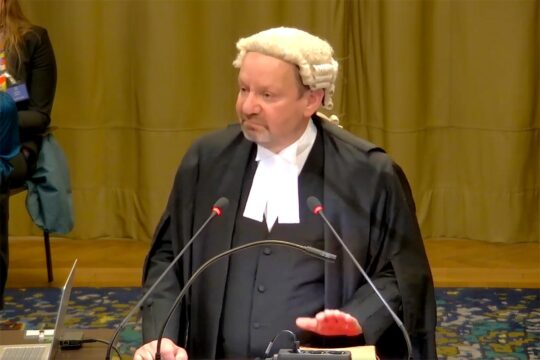Brussels, 5 April 2007 (FH) – On Tuesday in Brussels, the International Federation for Human Rights (FIDH) and the British NGO helping victims of torture (REDRESS) called for the suppression of “European safe havens for Rwandan genocide criminals”. On a list of 93 persons suspected of having participated in the genocide, established by the Rwandan government in May 2006, “37 reside in the countries of the European Union, particularly in Belgium, Denmark, Finland, France, Germany, Italy as well as Norway”, according to the FIDH and REDRESS, a non governmental organization created in 1992, which fights for the recognition of the victims’ rights before the international courts. In spite of “some positive developments” and proceedings pending in Belgium, Denmark, The Netherlands and the United Kingdom, the leaders of the two NGO regret, in a report published jointly to this conference, that “few countries have used their universal jurisdiction or another form of extraterritorial jurisdiction until now”. Taking into account the completion strategy of the International Criminal Tribunal for Rwanda (ICTR) which does not register any complaint anymore and which must close in 2010 at the latest, there is a risk that some genocide perpetrators will escape to prosecutions. Among the countries of the European Union to date, only Belgium has carried out proceedings against Rwandans who played a role in the genocide of 1994. Pursuant to the Belgian law of universal jurisdiction two trials, ending with convictions, took place in 2001 and 2005 and a third one, the Major Bernard Ntuyahaga case, will be held before the Belgian Court of Assises from 19 April. Apart from the countries of the European Union, a Swiss military tribunal was the first one to convict the former burgomaster of Mushubati in 1999, and in Canada on 26 March just started the trial of Désiré Munyaneza, first trial in this matter, pursuant to a law voted in 2000 which grants the Canadian courts a universal jurisdiction for war crimes and crimes against humanity. The two organizations recall that investigations and prosecutions against “perpetrators of the most serious crimes condemned by International law” are a “duty for all States, provided in International treaties and by the principles of the customary international law”, namely the Geneva Conventions of 1949 and their additional protocol of 1977, the International Convention repressing the Genocide of 1948 and the Statute of International Criminal Court of the Hague, entered into force in July 2002. The French inertance is particularly highlighted; in spite of numerous complaints against persons present on its territory, no prosecution has been engaged. Among others is the case of Abbey Wenceslas Munyeshyaka, working in a parish of the Evreux Diocese, suspected of complicity in the massacres of the parish of the catholic Saint Family of Kigali, who was not worried of prosecutions despite the opening of a procedure on 25 July 1995. For this slowness, the French authorities were condemned by the European Court of Human Rights on 8 June 2004. The jurisdiction of French courts to investigate crimes committed during the Rwandan genocide has however been provided by French law, since the adoption of the resolution 955 of the UN Security Council (founding the ICTR) into the law 96-432 on 22 May 1996. In addition to the lack of political will, the FIDH and REDRESS, which recommend a “common approach of the European Union about responsibility in the matter of genocide”, also point out the deficiencies of domestic legislation which sometimes frustrate the prosecution of genocide; the lack of judicial cooperation between States – contrary to policies realized in the “fight against terrorism and organized crime”, as well as the disparity of rules of procedure and judicial cultures. BF/PB/CV © Hirondelle News Agency
Countries
- Afghanistan
- Algeria
- Angola
- Argentina
- Armenia
- Australia
- Austria
- Azerbaijan
- Bahrain
- Bangladesh
- Belarus
- Belgium
- Benin
- Bosnia & Herzegovina
- Brazil
- Burkina Faso
- Burundi
- Cambodia
- Cameroon
- Canada
- Central African Republic
- Chad
- Chile
- China
- Colombia
- Cote d’Ivoire
- Croatia
- Cyprus
- Dem. Rep. Of Congo
- Denmark
- Ecuador
- Egypt
- El Salvador
- Equatorial Guinea
- Eritrea
- Ethiopia
- Finland
- France
- Gabon
- Gambia
- Georgia
- Germany
- Ghana
- Greenland
- Guatemala
- Guinea
- Haiti
- Honduras
- Hungary
- Indonesia
- Iran
- Iraq
- Ireland
- Israel
- Italy
- Japan
- Jordan
- Kenya
- Kosovo
- Laos
- Lebanon
- Liberia
- Libya
- Lithuania
- Malaysia
- Maldives
- Mali
- Mauritania
- Mauritius
- Mexico
- Myanmar
- Namibia
- Nepal
- Netherlands
- New Zealand
- Nicaragua
- Niger
- Nigeria
- North Korea
- Norway
- Pakistan
- Palestine
- Peru
- Philippines
- Poland
- Republic of Congo
- Russia
- Rwanda
- Scotland
- Senegal
- Serbia
- Seychelles
- Sierra Leone
- Somaliland
- South Africa
- South Korea
- South Sudan
- Spain
- Sri Lanka
- Sudan
- Suriname
- Sweden
- Switzerland
- Syria
- Taiwan
- Tanzania
- Thailand
- Timor-Leste
- Togo
- Tunisia
- Turkey
- Uganda
- Ukraine
- United Arab Emirates
- United Kingdom
- United States
- Uruguay
- Vanuatu
- Venezuela
- Vietnam
- Yemen
- Zimbabwe



